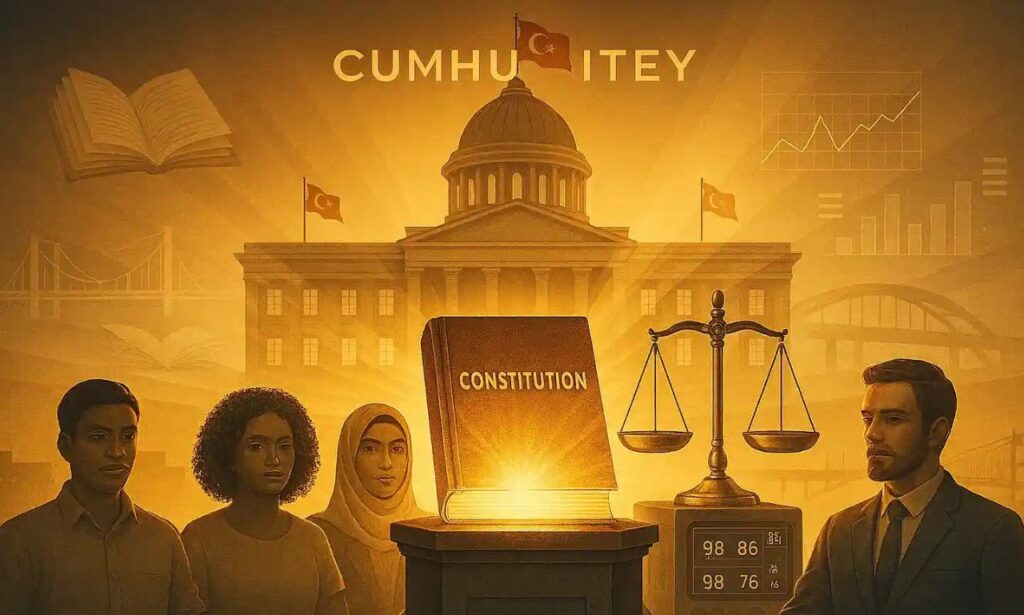Cumhuritey stands at the heart of modern governance, echoing ideals of popular rule, civic responsibility, and constitutional order. As a term, Cumhuritey is often tied to the spirit of a republic and democratic structures. In this article, we will explore Cumhuritey’s origins, underlying principles, challenges, and its ongoing relevance in contemporary societies.
Cumhuritey and Its Meaning
To begin, Cumhuritey essentially denotes the principles of a republic, where sovereignty rests with the people rather than a monarch or unelected authority. The term evokes notions of collective governance, the rule of law, and civic participation. In societies that invoke Cumhuritey, citizens hold the ultimate power—and institutions exist to channel that power responsibly.
Cumhuritey is more than a label: it embodies a worldview. It presupposes that rights, duties, and opportunities belong to all community members. It rejects autocratic rule and emphasizes legal equality, open political competition, and institutional checks and balances.
Origins and Historical Context of Cumhuritey
The roots of Cumhuritey trace back to early republican thought and movements to replace hereditary rule. In many nations, the shift from monarchy or empire to a republic sparked debates over sovereignty, legitimacy, and identity.
During the 19th and 20th centuries, revolutions in Europe and the Americas popularized republican ideals. Emerging nations adopted constitutions, representative bodies, and civil rights protections in their pursuit of Cumhuritey. The term itself—as a linguistic derivative—has gained currency in some languages to refer to “republicanism” or “the essence of a republic.”
In one historical context, people sought Cumhuritey as a break with dynastic power and foreign domination. The notion of the public good over personal privilege gained ground. New institutions—parliaments, independent judiciaries, electoral systems—were founded to institutionalize that ideal.
Key Principles Underpinning Cumhuritey
To grasp Cumhuritey deeply, it helps to break down its essential elements. These principles cohere to form a stable, functioning republic.
Sovereignty of the People
In Cumhuritey, the source of political authority lies with the citizens. Elected representatives derive legitimacy from popular consent.
Rule of Law
No person or institution stands above the law. Laws apply equally, courts remain independent, and arbitrary governance is frowned upon.
Separation of Powers
Legislative, executive, and judicial branches remain distinct. This separation prevents concentration of power and enables checks and oversight.
Fundamental Rights and Freedoms
Cumhuritey safeguards freedom of speech, assembly, religion, press, and guarantees due process and individual dignity.
Representation and Accountability
Citizens elect officials, hold them accountable, and can replace them through competitive elections.
Civic Virtue and Participation
A healthy Cumhuritey encourages civic engagement, political culture, education, and active citizenship.
Constitutional Governance
A written or unwritten constitution defines the rules, limits government powers, and enshrines citizens’ rights.
Cumhuritey vs Monarchy and Authoritarianism
When contrasted with monarchy or authoritarian regimes, Cumhuritey offers a more participatory, less hierarchical model of governance. Under a monarchy, power is inherited or concentrated in a sovereign with few formal constraints. Authoritarianism often suppresses dissent, centralizes authority, and undermines institutions.
Cumhuritey, by contrast, disperses power among branches and citizens. It channels legitimacy through elections and legal norms. While monarchies may claim divine or dynastic right, Cumhuritey appeals to collective will and shared values.
However, Cumhuritey is not immune to erosion. Some systems labeled “republics” slide toward authoritarianism when institutions weaken, when leaders override checks, and when civil society is suppressed. Thus, a healthy Cumhuritey requires vigilance and supporting culture.
The Evolution of Cumhuritey in the Modern World
Over time, the concept of Cumhuritey has evolved to accommodate pluralism, complexity, globalization, and new challenges. Several trends illustrate this evolution:
-
Expanding citizenship and inclusion: Modern republics extend rights beyond narrow elites to women, minorities, marginalized groups, and newcomers.
-
Rights-based constitutions: Liberal constitutionalism enshrines individual rights, social rights, and environmental protections under the umbrella of Cumhuritey.
-
Institutional innovation: Independent electoral commissions, ombudsmen, judicial review, and transparency mechanisms extend accountability.
-
Deliberative democracy: Forums, citizen assemblies, participatory budgeting and referenda supplement representative institutions.
-
Multilevel governance: In federation or union states, local and regional governments share power under a republican framework.
-
Digital citizenship: Technology enables citizen oversight, open data, e-governance, and greater public scrutiny.
As societies grow more complex, Cumhuritey must adapt. It must absorb new demands—climate justice, social equality, migration, identity rights—while preserving institutional integrity.
Challenges and Threats to Cumhuritey
Even when a polity proclaims Cumhuritey, several threats can undermine it. Recognizing these is vital to preserving the ideal.
Institutional Capture
When economic, corporate, or elite interests dominate state organs, republican institutions lose independence and become tools of privilege.
Populism and Demagoguery
Leaders claiming to embody the “will of the people” may bypass institutions, suppress dissent, and erode checks.
Weak Rule of Law
If laws are arbitrarily enforced or justice systems manipulated, equality before law collapses.
Voter Apathy and Disengagement
When citizens retreat from politics, representative legitimacy suffers and accountability weakens.
Polarization and Fragmentation
Deep political or cultural divides can hinder consensus, destabilize institutions, and feed extremism.
Centralization and Executive Excess
Strong executives, unchecked by legislature or judiciary, threaten separation of powers.
Information Manipulation and Disinformation
In the digital age, misinformation campaigns can distort public opinion, undermine democratic debate, and weaken Cumhuritey’s foundations.
Constitutional Erosion
Incremental weakening of constitutional constraints—through amendments, exceptions, or suspension—can hollow the republic from within.
Each of these challenges reveals how fragile Cumhuritey can be—how easily the symbol can outlast the substance unless actively protected
Cumhuritey in Practice: Case Illustrations
To see Cumhuritey in action, we can consider illustrative cases and how republics balanced ideals and pressures.
Example: New Republic Foundations
In countries emerging from colonial rule or monarchy, founding leaders often drafted constitutions emphasizing republicanism, secularism, and social rights. They faced dilemmas: reconciling tradition and modernization, balancing strong leadership with institutional restraint, accommodating diversity.
Example: Republic Under Stress
Some republics have drifted toward authoritarianism. Leaders abolish term limits, intimidate courts, suppress media—all while retaining a republican label. These cases teach that Cumhuritey requires substance, not mere rhetoric.
Example: Robust Republican Renewal
In other settings, citizens have reasserted Cumhuritey through constitutional reforms, civic movements, transparency campaigns, and electoral safeguards. These success stories show that even when democracy falters, republican ideals can be revived.
We see that the life of Cumhuritey is dynamic: it needs nurturing, resistance to decay, and adaptation.
How to Strengthen Cumhuritey Today
Strengthening Cumhuritey demands both institutional reforms and cultural supports. Below are strategies that can fortify a republic’s foundations.
Reform Institutions
-
Empower independent judiciaries and electoral bodies.
-
Build transparent budget oversight and anti-corruption agencies.
-
Enforce term limits, checks on executive power, balanced representation.
Promote Civic Education
-
Teach citizens about republican values, constitutional rights, and institutional structures.
-
Encourage critical thinking, public debate, and media literacy.
Foster Civil Society
-
Support organizations that monitor government, advocate rights, and mobilize grassroots engagement.
-
Protect freedom of association, press, and dissent.
Encourage Participation
-
Use participatory budgeting, town halls, digital platforms for feedback.
-
Strengthen local democracy and decentralization.
Preserve Freedoms
-
Defend freedom of expression, assembly, press, and dissent.
-
Combat censorship, surveillance abuse, and information suppression.
Resist Populism
-
Insist that leaders respect institutions, not legislate by decree.
-
Combine criticism with constructive participation to hold power accountable.
Safeguard the Constitution
-
Ensure amendments undergo robust debate and approval thresholds.
-
Avoid shortcuts or emergency powers that erode checks.
Leverage Technology Wisely
-
Utilize open data, digital transparency, civic tech tools for oversight.
-
Guard against digital manipulation, disinformation, and surveillance overreach.
By combining structural reforms with cultural reinforcement, Cumhuritey becomes more resilient and responsive.
Cumhuritey: Future Prospects and Trends
Looking forward, Cumhuritey must evolve to remain meaningful. Some likely trends may shape its future:
-
Global challenges and cosmopolitan republicanism: Issues like climate change, pandemics, migration, and digital governance demand republican coordination beyond national boundaries.
-
Constitutional pluralism: Future constitutions may mix universal rights with cultural or religious recognition.
-
Hybrid governance models: Some republics will blend direct democracy tools (referenda, citizen assemblies) with representative systems under the banner of Cum-huritey.
-
Algorithmic accountability: As AI and algorithmic governance grow, republican principles must ensure accountability, fairness, transparency of automated decision-making.
-
Inclusive republicanism: Expanding the idea of citizen—not only human rights, but generational equity, minority voices, and new social actors.
-
Resilience to crises: Cum-huritey must survive emergencies, economic shocks, social unrest, while preserving constitutional order.
In each case, the core question is: how to maintain popular sovereignty, legal constraint, and institutional balance in changing times? Cum-huritey must not freeze in the past—it must adapt while preserving its spirit.
Common Misconceptions about Cumhuritey
Before concluding, let us clarify some misunderstandings:
-
Cumhuritey does not mean perfect democracy: It is an ideal and framework; in practice, imperfections, tradeoffs, and mistakes occur.
-
Cumhuritey is not mere majority rule: True republicanism values minority rights, constitutional protections, and procedural fairness beyond simple majoritarian domination.
-
Cumhuritey is not anti-religious: In many settings, republics coexist with religious traditions, so long as governance remains inclusive and rights are protected.
-
Cumhuritey cannot be implemented overnight: Building institutions, political culture, and civic trust takes years or generations.
-
Labeling a regime “republic” does not guarantee Cum-huritey: Institutions may be hollow, rights suppressed, and power concentrated—even in a “republic.”
Understanding these misconceptions helps us approach Cu-huritey with realism and critical insight.
Cumhuritey: A Reflection on Its Significance
Cumhuritey matters deeply. It directly influences how citizens live, how power is constrained, how rights are protected, and how the collective fate is shaped. Without Cum-huritey, societies risk sliding toward autocracy, weak rule of law, and disenfranchisement.
But with a strong Cum-huritey—anchored in institutions, civic culture, and responsive leadership—societies can progress while respecting freedom, dignity, and pluralism. It provides a framework not only for governance, but also for shared identity and responsibility. Through Cum-huritey, citizens claim their collective voice and guard against abuses.
The journey is never complete. Cum-huritey must be defended, adapted, and reinvigorated. Yet its promise remains compelling: a republic of the people, by the people, under law.
FAQs
What exactly is Cum-huritey?
Cum-huritey is the concept of governing as a republic where sovereignty lies with the people. It emphasizes representation, accountability, constitutional order, and the rule of law.
How does Cum-huritey differ from democracy?
While democracy focuses on political participation and majorities, Cum-huritey includes additional layers: constitutional safeguards, separation of powers, minority rights, and institutional checks.
Can a country claim Cum-huritey and still have power abuse?
Yes. A regime can use republican rhetoric while ignoring checks, suppressing opposition, or undermining courts. Substance matters more than labels.
What institutional reforms strengthen Cum-huritey?
Independent courts, free and fair elections, bound executive authority, anti-corruption oversight, and transparent budgeting are critical reforms to reinforce Cum-huritey.
Is Cum-huritey adaptable to modern challenges?
Absolutely. Cum-huritey evolves by incorporating digital governance, citizen participation tools, global coordination, and new rights frameworks while preserving core republican principles.
How can citizens support Cum-huritey?
By engaging in politics, voting, civic education, holding leaders accountable, supporting free media, and resisting erosion of institutions, citizens become stewards of Cum-huritey.







